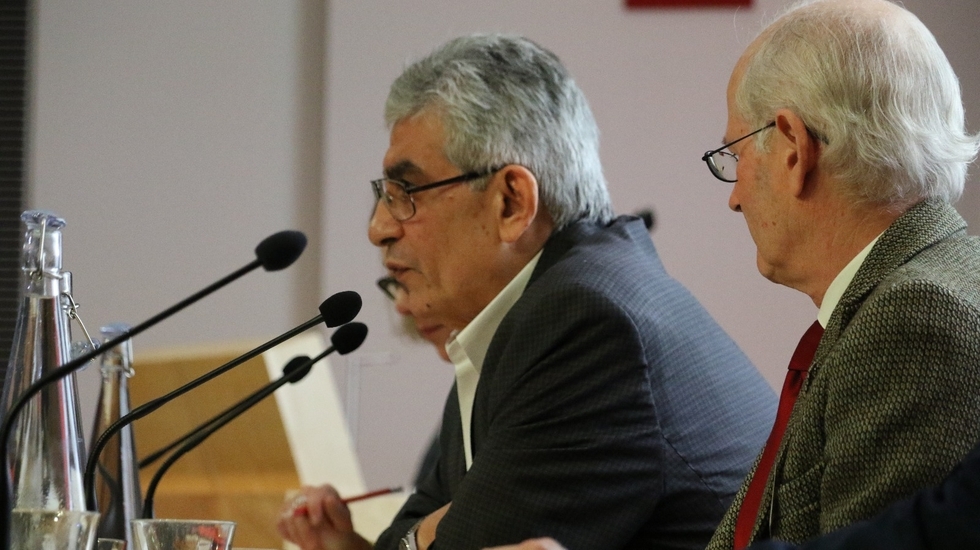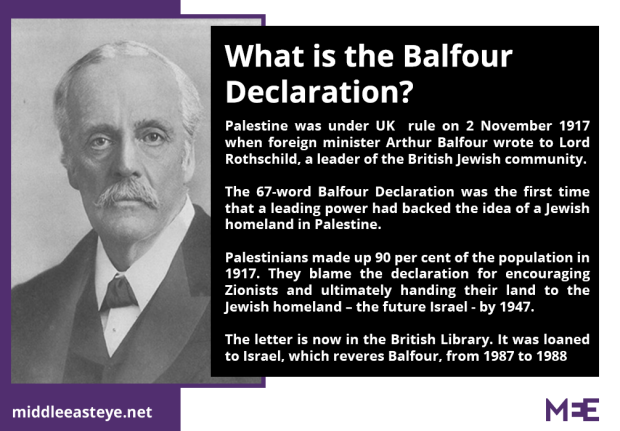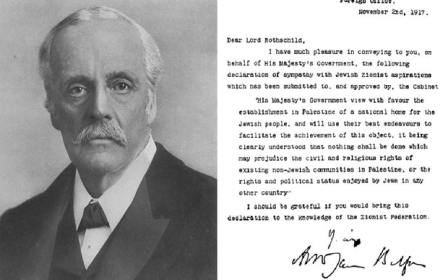Revealed: Balfour considered a Jewish state 'inadmissible'

LONDON - The author of the British document which recognised the right of Jews to set up a "homeland" in Palestine later expressed misgivings about the possibility of it becoming a state , new research reveals.
There is no official evidence that Britain supported the establishment of a Jewish state in Palestine through the Balfour Declaration, claimed Palestinian historian Basheer Nafi during a conference on Saturday marking the centenary of the agreement.
While "the Balfour declaration was the source of all evils in the Middle East ... it seems [the Declaration] was not meant to engender the amount of evil it came to bring about," said Nafi, senior research fellow at Al Jazeera Centre for Studies, during the conference held at the British Library, where the Balfour Declaration is now kept.
The event, organised by Middle East Monitor, brought together three panel discussions covering how the 1917 declaration came into existence while explaining Britain's role in the establishment of the Israeli state.
Jewish home is no doubt an ambiguous term but one that certainly does not mean a Jewish state
- Basheer Nafi, historian
Nafi insisted that Britain did not mean to officially condone the establishment of a Jewish state in Palestine but a state eventually came about.
The Balfour Declaration has long been regarded as the document which underpinned the creation of the State of Israel after former UK foreign secretary Arthur Balfour spelled out the main points of the agreement in a letter to the leader of the British Jewish community, Walter Rothschild, for a Jewish state in Palestine.
"His Majesty's government views with favour the establishment in Palestine of a national home for the Jews, and will use their best endeavours to facilitate the achievement of this objective," stated the letter."It is being clearly understood that nothing shall be done which may prejudice the civil and religious rights of existing non-Jewish communities in Palestine."
Nafi claimed on Saturday that the agreement had only mentioned British support for a "Jewish home, [that] is no doubt an ambiguous term but one that certainly does not mean a Jewish state. It had no precedent in international law."
An exchange of letters between January and March 1919 between Balfour and George Curzon, who replaced Balfour as foreign secretary that same year, shows the trepidation that existed in British government circles over their earlier promise to create a Jewish home in Palestine.
"A Jewish government in any form would mean an Arab uprising and the nine-tenth of the population who are not Jews would make a short shrift with the Hebrews," said the interchange of letters.
Curzon reportedly went on to agree with this view while describing the "pretensions of Weizmann and Company" as "extravagant and out to be checked".
Chaim Weizmann was a Zionist leader and Israeli statesman who served as president of the Zionist Organisation and later first president of Israel in 1949. In a reply from Balfour to Curzon on 20 January 1919, it appears that Britain had been unsupportive of Weizmann's aspirations for a Jewish state.
"As far as I know, Weizmann has never put forward a claim for the Jewish government in Palestine. Such a claim is in my opinion certainly inadmissible, and personally I do not think we should go further than the original declaration which I made to Lord Rosthchild," said Balfour.
"While Weizmann may say one thing to you, and while you may mean one thing by a national home, he is out for something quite different," replied Curzon.
Rising tensions among Palestine's Arab community over Jewish immigration to Palestine made British governance of the mandate increasingly difficult.
A number of uprisings and riots eventually increased pressure on the British authorities to limit the number of Jews entering the territory.
Nafi explained that in a third letter Curzon expressed a "growing sense of desperation over the Palestine policy" while commenting on a decision by the Peace Conference to send an American commission of inquiry to the Middle East.
"Both [Balfour and Curzon] were unmistakably clear that the declaration was not about the establishment of a Jewish state in Palestine," said Nafi.
He told MEE that while the letters show that there is no evidence between 1917 and the 1930s "that Britiain meant by the term 'Jewish national home' a Jewish state in Palestine ... that doesn't absolve Britain of its responsibility nor does it whitewash its involvement in the Middle East."
Balfour's main victims
According to Avi Shlaim, Emeritus professor of international relations at Oxford University, the main victims of the Balfour Declaration were the Arabs of Palestine.
"The declaration was a classic European colonial document cobbled together by a small group of men with a thoroughly colonial mind-set. It was formulated in total disregard for the political rights of the majority of the indigenous population," he wrote earlier this year.
Shlaim also pointed out that British foreign secretary Balfour had made "no effort to disguise his contempt for the Arabs".
"Zionism, be it right or wrong, good or bad," he wrote in 1922, was "rooted in age-long traditions, in present needs and future hopes of far profounder import than the desires and prejudices of 700,000 Arabs who now inhabit that ancient land." There could hardly be a more striking illustration of what Edward Said called "the moral epistemology of imperialism".
Although named after Blfour, "real driving force behind the declaration", according to Shlaim was David Lloyd George, a Welsh radical who headed the government.
George's "support for Zionism, however, was based not on a sound assessment of British interests but on ignorance: he admired the Jews but he also feared them and he failed to grasp that the Zionists were a minority within a minority," wrote Shlaim.
New MEE newsletter: Jerusalem Dispatch
Sign up to get the latest insights and analysis on Israel-Palestine, alongside Turkey Unpacked and other MEE newsletters
Middle East Eye delivers independent and unrivalled coverage and analysis of the Middle East, North Africa and beyond. To learn more about republishing this content and the associated fees, please fill out this form. More about MEE can be found here.





